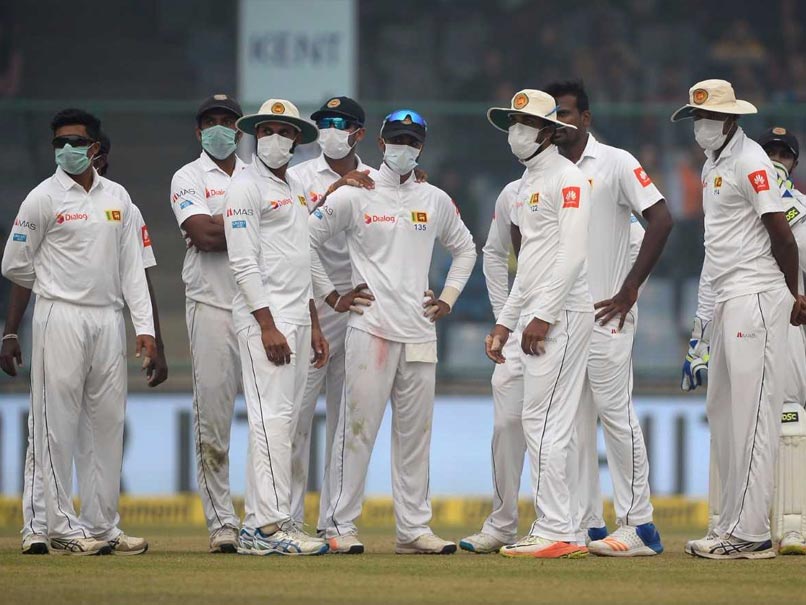India vs Sri Lanka, 3rd Test, Day 2: Players Were Vomiting Due To Smog, Says Lanka Coach Nic Pothas
Play was halted for around 20 minutes at the Feroz Shah Kotla stadium as Sri Lankan fielders complained of health troubles and the umpires consulted the match referee and team doctors.
- Agence France-Presse
- Updated: December 03, 2017 07:35 pm IST

Highlights
-
Play was halted for a few minutes after lunch
-
Lankan players wore masks during the match
-
Lankan coach said that the players vomited due to smog
Pollution stopped play Sunday in the third Test between India and Sri Lanka, and visiting coach Nic Pothas said the smog was so extreme that his players -- who took the extraordinary step of wearing face masks -- were 'coming off the field and vomiting'. Concentrations of the smallest and most harmful airborne pollutants in Delhi, one of the world's most polluted capitals, hit 384 -- 15 times the World Health Organization maximum -- before returning to levels considered just 'unhealthy', the US embassy website showed.
Play was halted for around 20 minutes at the Feroz Shah Kotla stadium as Sri Lankan fielders complained of health troubles and the umpires consulted the match referee and team doctors.
Play resumed but Sri Lanka protested twice more, with the visitors soon short on fielders as pacemen Lahiru Gamage and Suranga Lakmal returned to the pavilion.
Indian skipper Virat Kohli declared his first innings on 536 for seven to get the visiting fielders off the ground after the third stoppage.
India's powerful cricket board was less than impressed, accusing the visitors of making a fuss, and vowed to write to its Sri Lankan counterpart about the incident. But Pothas said his men were physically sick amid the "extremely high" pollution levels choking the ground.
"We had players coming off the field and vomiting," he told reporters after the match. "There were oxygen cylinders in the change room. It's not normal for players to suffer in that way while playing the game."
Pothas said Lakmal was "continuously vomiting" in the changing room, where the team doctors and the match referee had gathered to assess the situation.
"I think it's the first time that everybody has come across that situation," he added.
"There aren't too many rules regarding pollution. What we are going to do tomorrow is in the hands of the match referee. They will have meetings tonight to put in some sort of a precedent if it happens like this tomorrow."
- Not normal -
Play is routinely suspended due to poor weather, low visibility, lightning or rain, but a stoppage as a result of pollution is almost unheard of.
"It is definitely a first of its kind," said one commentator on the official television broadcast.
Indian sports commentator Ayaz Memon said the dramatic scenes sent an "unedifying message about Delhi's pollution" and urged authorities to combat the scourge.
The Board of Control for Cricket in India accused the visiting side of making a "big fuss".
"If 20,000 people in the stands did not have problem and the Indian team did not face any issue, I wonder why Sri Lankan team made a big fuss?" said CK Khanna, acting BCCI president.
Many Indian fans echoed similar frustrations online, accusing the touring side of being melodramatic.
The islanders were booed by Indian fans as their opening batsmen walked to the crease after Kohli's declaration.
But earlier in the day Indian bowler Kuldeep Yadav was also seen sporting a mask as he brought drinks to teammates on the field.
Delhi has been ranked among the world's most polluted capital cities, with air quality worsening in winter as cooler air traps pollutants near the ground.
Doctors last month declared a public health emergency in the capital as pollution soared to 40 times the level deemed safe by the WHO, shutting down schools for days.
But that did not stop more than 30,000 runners competing in the Delhi half-marathon last month, despite dire health warnings from doctors who called for the race to be postponed.
Doctors warn that competitive exercise during severe pollution can trigger asthma attacks, worsen lung conditions and increase the risk of heart attacks and strokes.
Other top-level sporting events in Delhi, such as international cricket and golf tournaments, have attracted less attention despite the hazardous levels of pollution.
Authorities in Delhi have in recent years closed power plants temporarily and experimented with taking some cars off the road but the measures have had little effect.

